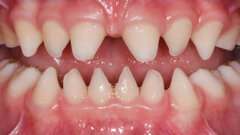SOLNA, Sweden: In a recent study, researchers at Karolinska Institutet have found a link between the presence of oral bacteria in cystic pancreatic tumours and the severity of the tumour. The findings could help improve the diagnosis and treatment of pancreatic cancer and avoid unnecessary surgery.
The researchers examined the presence of bacterial DNA in fluid taken from 105 patients’ pancreatic cysts and compared the type and severity of the tumours. To identify the bacteria, the researchers sequenced 35 DNA samples that contained high amounts of bacterial DNA. They found that the fluid from cysts with high-grade dysplasia and cancer contained much more bacterial DNA than that compared with benign cysts.
“We find most bacteria at the stage where the cysts are starting to show signs of cancer,” said co-author Dr Margaret Sällberg Chen, an associate professor and senior lecturer at the institute. “What we hope is that this can be used as a biomarker for the early identification of the cancerous cysts that need to be surgically removed to cure cancer; this will in turn also reduce the amount of unnecessary surgery of benignant tumours. But first, studies will be needed to corroborate our findings.”
According to Sällberg Chen, the findings could help re-evaluate the role of bacteria in the development of pancreatic cysts. If further studies prove that bacteria affect the pathological process, it could lead to new therapeutic strategies using antibacterial agents.
The researchers also looked at factors that could affect the amount of bacterial DNA found in the tumouric fluid and reported higher DNA bacterial presence in patients who had undergone invasive pancreatic endoscopy. “The results were not completely unequivocal, so the endoscopy can’t be the whole answer to why the bacteria is there,” said Sällberg Chen. “But maybe we can reduce the risk of transferring oral bacteria to the pancreas by rinsing the mouth with an antibacterial agent and ensuring good oral hygiene prior to examination. That would be an interesting clinical study.”
The study, titled “Enrichment of oral microbiota in early cystic precursors to invasive pancreatic cancer”, was published online on 14 March 2019 in Gut ahead of inclusion in an issue.
Tags:
TORONTO, Canada: A new study has shown that dentists are playing an important role in detecting oral cancer. After examining data gathered over an 11-year ...
HELSINKI, Finland: Researchers in Finland have investigated the role of a bacterium strongly associated with periodontitis in the development of oral and ...
Vitamin D is a steroid hormone that is obtained through diet or synthesised in the skin from cholesterol when the skin receives adequate sun exposure (the ...
LONDON, UK: The role of the household may have an influence not only at the social level, but also at the microbe level. In a study conducted in the UK, ...
OSLO, Norway: Researchers have recently investigated attitudes and activities among dental healthcare professionals working in the public dental service ...
RIYADH, Saudi Arabia: Oral cancer constitutes a major front in the global fight against non-communicable diseases, and heightened public awareness of risk ...
NORMAN, Okla., U.S.: A considerable proportion of oral cancer diagnoses are made when the cancer is advanced. A University of Oklahoma (OU) researcher is ...
Antimicrobial resistance (AMR) is an increasingly critical global health issue. According to the World Health Organization (WHO), bacterial AMR was directly...
NEW YORK, US: Oral tumours can cause agonising pain and thus greatly impair the quality of life of patients. Researchers from the New York University ...
RUGBY, UK: In a large series of studies conducted in Italy and Switzerland, researchers have found that people who ate green vegetables were less likely to ...
Live webinar
Wed. 14 January 2026
12:00 pm EST (New York)
Dr. Théo Laplane, Dr. Robert Gottlander DDS
Live webinar
Fri. 16 January 2026
12:00 pm EST (New York)
Live webinar
Mon. 19 January 2026
1:00 pm EST (New York)
Philipp Kopp, Michael Seeber
Live webinar
Thu. 22 January 2026
9:00 am EST (New York)
Prof. Judith Jones D.D.S; M.P.H., Prof. Kakuhiro Fukai D.D.S., Ph.D, Dr. Bathsheba (Bethy) Turton
Live webinar
Thu. 22 January 2026
2:00 pm EST (New York)
Dr. Nicola M. Grande DDS, PhD
Live webinar
Wed. 28 January 2026
8:00 am EST (New York)
Live webinar
Wed. 28 January 2026
11:00 am EST (New York)
Prof. Dr. Jan-Frederik Güth



 Austria / Österreich
Austria / Österreich
 Bosnia and Herzegovina / Босна и Херцеговина
Bosnia and Herzegovina / Босна и Херцеговина
 Bulgaria / България
Bulgaria / България
 Croatia / Hrvatska
Croatia / Hrvatska
 Czech Republic & Slovakia / Česká republika & Slovensko
Czech Republic & Slovakia / Česká republika & Slovensko
 France / France
France / France
 Germany / Deutschland
Germany / Deutschland
 Greece / ΕΛΛΑΔΑ
Greece / ΕΛΛΑΔΑ
 Hungary / Hungary
Hungary / Hungary
 Italy / Italia
Italy / Italia
 Netherlands / Nederland
Netherlands / Nederland
 Nordic / Nordic
Nordic / Nordic
 Poland / Polska
Poland / Polska
 Portugal / Portugal
Portugal / Portugal
 Romania & Moldova / România & Moldova
Romania & Moldova / România & Moldova
 Slovenia / Slovenija
Slovenia / Slovenija
 Serbia & Montenegro / Србија и Црна Гора
Serbia & Montenegro / Србија и Црна Гора
 Spain / España
Spain / España
 Switzerland / Schweiz
Switzerland / Schweiz
 Turkey / Türkiye
Turkey / Türkiye
 UK & Ireland / UK & Ireland
UK & Ireland / UK & Ireland
 Brazil / Brasil
Brazil / Brasil
 Canada / Canada
Canada / Canada
 Latin America / Latinoamérica
Latin America / Latinoamérica
 USA / USA
USA / USA
 China / 中国
China / 中国
 India / भारत गणराज्य
India / भारत गणराज्य
 Pakistan / Pākistān
Pakistan / Pākistān
 Vietnam / Việt Nam
Vietnam / Việt Nam
 ASEAN / ASEAN
ASEAN / ASEAN
 Israel / מְדִינַת יִשְׂרָאֵל
Israel / מְדִינַת יִשְׂרָאֵל
 Algeria, Morocco & Tunisia / الجزائر والمغرب وتونس
Algeria, Morocco & Tunisia / الجزائر والمغرب وتونس
 Middle East / Middle East
Middle East / Middle East
















































To post a reply please login or register